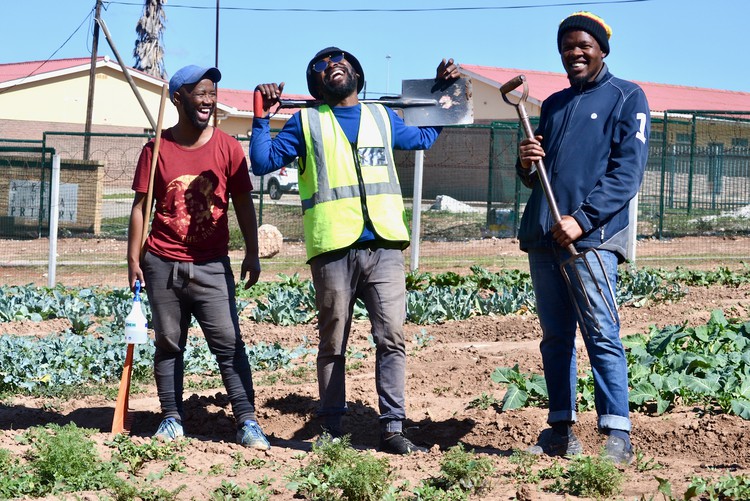Unemployed Uitenhage men are making food gardening “fashionable” again
Food garden developed during the Covid-19 lockdown is showing results
From left to right: Mendo Vece, Siyabulela Booysen and Sakhumzi Mbaduli developed a food garden during the Covid-19 lockdown. Photo: Thamsanqa Mbovane
In March three unemployed men from KwaNobuhle, Uitenhage, decided to start growing their own food. As it turned out, a week later the Covid-19 national lockdown started.
Siyabulela Booysen, Sakhumzi Mbaduli and Mendo Vece had no experience. They started by collecting empty bottles from friends and family and selling them to get the money they needed to buy seedlings.
The caretaker of Babs Madlakane Hall, who lives on the site, gave them permission to use his yard at the back of the hall for free.
Mbaduli said they cleared the land of broken glass, litter and weeds. They organised fertiliser and manure and planted spinach, cabbage and beetroot first.
Operating on Mondays, Wednesday and Fridays, their Lima Gardening Initiative is showing promise. The name is mali (money) spelt backwards.
“Today we sowed broccoli, fresh mint, and carrot and we have 25 plots on this land,” said Mbaduli.
“We could employ a lot of youth via this project by mid-September, when we are ready to harvest.”
Customer Mzimkhulu Mayo, who was buying a bunch of spinach for R7, said, “It encourages me to buy locally and also to promote gardening projects to be a habit to our community, especially during this time of Covid-19 … Unemployment is rising, more especially for the youth … So indeed it’s a pleasure for me to support this kind of project in our community.”
Booysen said they planned to make gardening “fashionable” again. “Gardening is regarded as old people’s work and the youth think they cannot form part of it,” he said. “In our township it’s mainly old pensioners who are into gardening.”
Vece said, “We will sell vegetables at affordable prices and the profit will go into making a soup kitchen. That’s how we will plough back to the community.”
Support independent journalism
Donate using Payfast

Don't miss out on the latest news
We respect your privacy, and promise we won't spam you.
Next: Masiphumelele upgrade plan approved but Noordhoek group’s appeal still pending
Previous: No hope of Cape Town central line resuming any time soon
© 2020 GroundUp. This article is licensed under a Creative Commons Attribution-NoDerivatives 4.0 International License.
You may republish this article, so long as you credit the authors and GroundUp, and do not change the text. Please include a link back to the original article.

